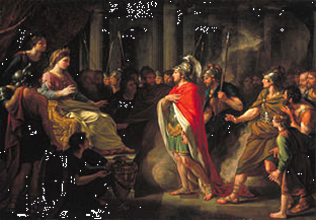I can always tell when I’ve really enjoyed a concert, because during the drive home I have no urge to turn on the radio, preferring instead to savor the remaining strains of music still bouncing around my head. Such was the case after hearing Chamber Music Wilmington’s second concert of their 2007-08 season that featured the Alexander String Quartet (based in San Francisco) within the fine acoustics of the recital hall at UNCW.
The evening began with three selections from John Adams’ John’s Book of Alleged Dances (1994): “Toot Nipple,” “Pavane: She’s So Fine,” and “Judah to Ocean,” and despite their whimsical titles, these pieces are by no means trifles. “Pavane” was particularly satisfying, with Sandy Wilson, cello, and Zakarias Grafilo, first violin, offering some marvelous lines of solo material played in the uppermost registers. The ensemble’s handling of meter changes was similarly masterful, making it clear to the listener how groups of rhythms related to one another. “Judah to Ocean” is even more rhythmically challenging, as it employs a recorded percussion track with which the players must interact, in addition to one another. During the performance I found myself wondering how musicians even begin rehearsing a piece like this, but the Alexander Quartet made it seem easy.
Next on the program was Ravel’s String Quartet. After the “vehicular music” (Adams’ description) of “Judah to Ocean,” the opening bars of the Ravel were an acute change in musical scenery, to be sure. The ensemble found what seems to me to be the essence of this movement, with its lyricism and pastoral temperament, without being too sentimental. Also commendable was the range of dynamics, and that every ritard and accelerando was astonishingly synchronized among the performers.
The quartet took the second movement, famous for its pizzicatos, at an electric tempo, and 99% of the plucks were quite clean. I did hear a brief intonation problem leading into the middle section, but Paul Yarbrough, viola, more than made up for his small lapse with some wonderful solo material in the third movement. The finale, while perhaps not as musically interesting as the other movements, had great energy, and the ensemble closed the quartet with zest.
After intermission, we continued our journey backward through music history, hearing Beethoven’s String Quartet in C-sharp Minor, Op. 131. The late quartets of Beethoven are holy ground for many listeners and string players alike, and the Alexander Quartet succeeded in creating a sense of commune with the composer. Most notable was how they captured the various, disparate moods within the piece, which cover a vast emotional spectrum and often juxtapose one another quite suddenly. There is such drama at work that the musical narrative could be confusing in the hands of a lesser ensemble, but on this occasion, the quartet helped us understand the Profound.
The only criticisms I would offer are that, during the Presto, the ends of phrases were sometimes abbreviated, and while difficult to accomplish at tempo, a handful of musical sentences lacked punctuation. Also, Wilson’s cello has potent resonance, and in the Andante, his instrument came over a little too loud from time to time, especially on low notes. Otherwise, the performance was outstanding, and Chamber Music Wilmington should be congratulated for bringing such a preeminent quartet to town.













